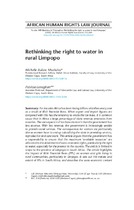| dc.contributor.author | Maziwisa, Michelle | |
| dc.contributor.author | Lenaghan, Patricia | |
| dc.date.accessioned | 2021-05-27T10:08:33Z | |
| dc.date.available | 2021-05-27T10:08:33Z | |
| dc.date.issued | 2020 | |
| dc.identifier.citation | Maziwisa, M., & Lenaghan, P. (2020). Rethinking the right to water in rural Limpopo. African Human Rights Law Journal, 20(1), 233 - 260 | en_US |
| dc.identifier.issn | 1996-2096 | |
| dc.identifier.uri | https://doi.org/10.17159/1996-2096/2020/v20n1a9 | |
| dc.identifier.uri | http://hdl.handle.net/10566/6211 | |
| dc.description.abstract | For decades Africa has been losing billions of dollars every year
as a result of illicit financial flows. When export and import figures are
tampered with this has the tendency to erode the tax base. It is common
cause that in Africa a large percentage of state revenue emanates from
taxation. The consequence of tax base erosion is that the government has
less revenue. With less revenue, the government is increasingly unable
to provide social services. The consequences for women are particularly
dire as women have to end up subsidising the state in providing services,
reproductive and care work. This article argues that the government has
a responsibility to ensure that the maximum ‘available resources’ are
allocated to the attainment of socio-economic rights, particularly the right
to water, especially for the poorest in the country. The article is limited in
scope to the province of Limpopo in South Africa. | en_US |
| dc.language.iso | en | en_US |
| dc.publisher | Pretoria University Law Press | en_US |
| dc.subject | Socio-economic rights | en_US |
| dc.subject | Rights-based approach | en_US |
| dc.subject | Right of access to water | en_US |
| dc.subject | Illicit financial flows | en_US |
| dc.subject | Rural communities | en_US |
| dc.subject | Limpopo | en_US |
| dc.title | Rethinking the right to water in rural Limpopo | en_US |
| dc.type | Article | en_US |

